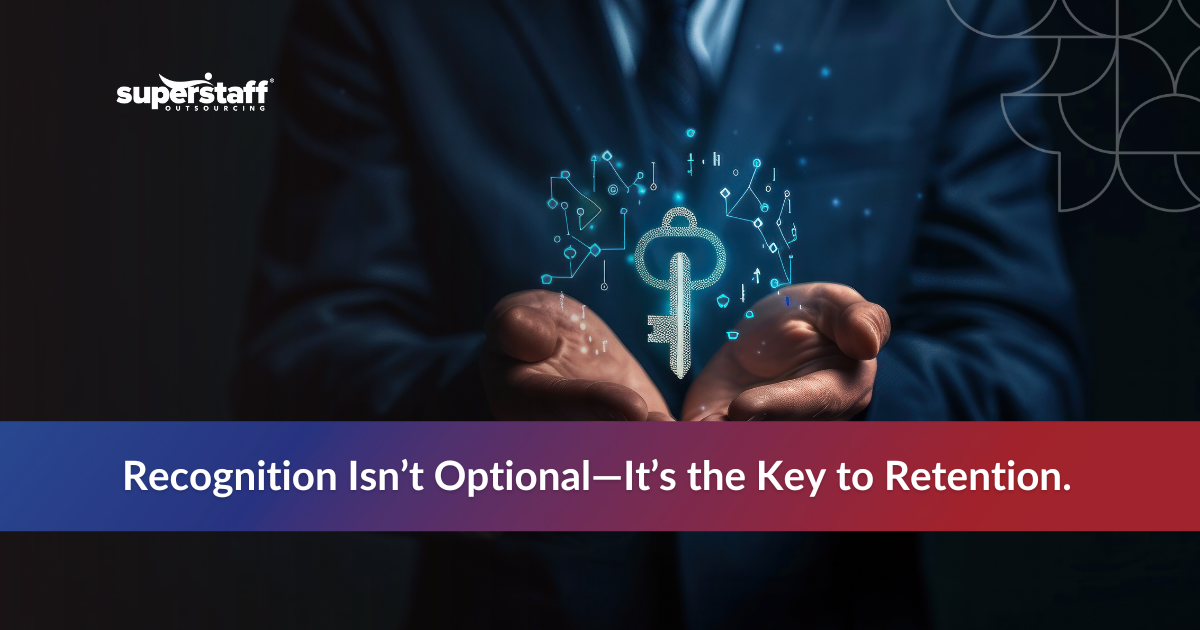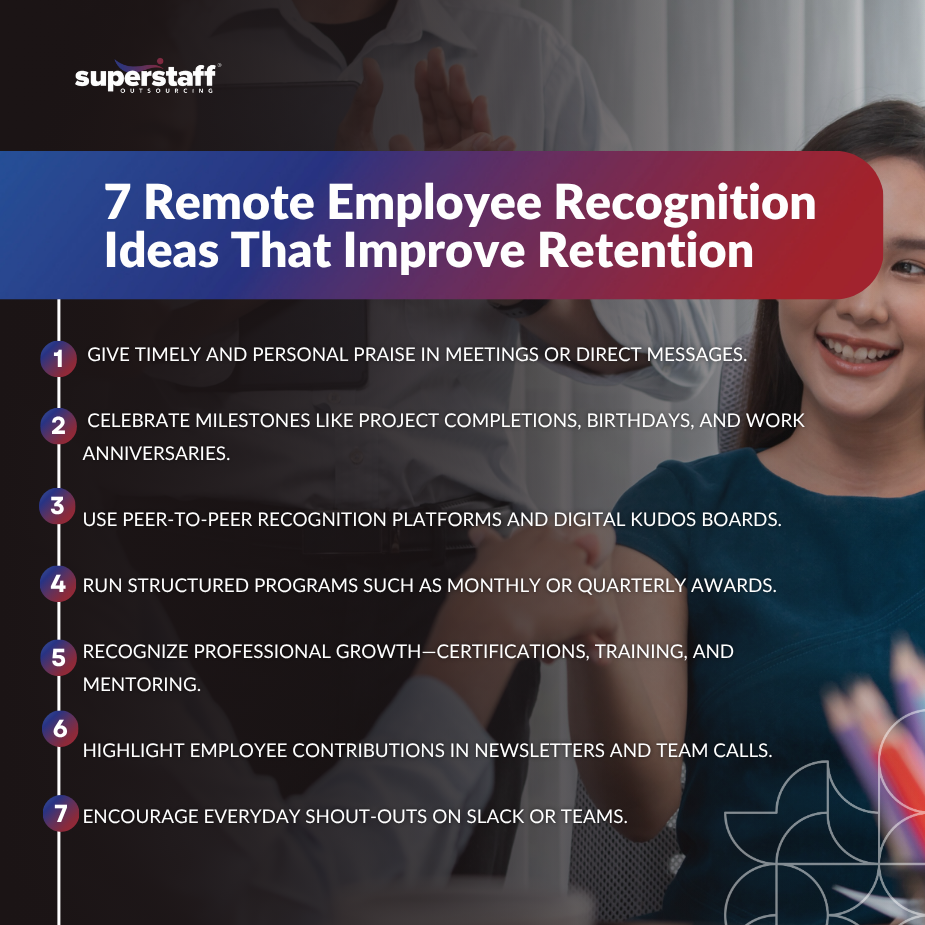
Keeping remote employees engaged and loyal is one of the biggest challenges businesses face today. Without the daily interactions, casual conversations, and visible acknowledgments that happen in an office, remote workers can often feel overlooked or disconnected from their teams. This makes recognition more than just a “nice to have”; it becomes the glue that holds distributed teams together.
Recognition has always played a central role in building strong workplace cultures, but in a remote setting, it carries even greater weight. Employees who feel unseen are more likely to disengage, while those who feel valued are more motivated, productive, and committed to staying with their company.
That’s why recognition should never be treated as an occasional perk. Instead, it needs to be viewed as a strategic approach to improving morale, reducing turnover, and building long-term loyalty. When done right, recognition doesn’t just celebrate performance; it reinforces belonging.
In this blog, we’ll explore why recognition matters and share actionable remote employee recognition ideas that companies can implement to create stronger connections, boost retention, and inspire teams to thrive, no matter where they’re working from.
Recognition is a Key Driver of Employee Engagement and Loyalty
Employee recognition has a direct impact on engagement, productivity, and satisfaction. Studies consistently show that when employees feel appreciated, they are more likely to go above and beyond, collaborate more effectively, and remain committed to their organization. Recognition validates their contributions and reminds them that their work truly matters.
For remote employees, this validation is even more critical. Unlike office-based teams, they don’t benefit from casual hallway conversations, spontaneous “thank yous,” or the visible acknowledgment that comes naturally in face-to-face environments. Without these touchpoints, remote workers risk feeling isolated or undervalued.
In fact, disengagement among remote teams often stems from the absence of recognition. Employees who feel invisible may disengage, leading to lower performance and higher attrition. Conversely, when recognition is woven into remote work culture, it strengthens connections and loyalty.
As such, implementing various remote employee recognition ideas should not be treated as optional; it should be seen as a foundational driver of both engagement and retention.
If recognition drives retention, the question becomes: how can companies implement it effectively in a remote setting?

Timely and Personal Recognition Keeps Remote Employees Connected
One of the most effective ways to foster remote employee engagement is through recognition that feels timely and personal. Generic appreciation may go unnoticed, but specific acknowledgment that directly references an employee’s effort resonates deeply.
When recognition happens in real time, it reinforces positive behavior. Employees feel motivated to continue excelling when they see that their contributions are valued immediately. This can be as simple as:
- Calling out someone’s effort during a virtual team meeting.
- Sending a personalized message that highlights specific contributions.
- Celebrating milestones like project completions or client wins in a public setting.
For example, a manager might pause a video call to acknowledge a team member’s creative problem-solving or send a direct Slack message praising someone’s extra effort during a deadline crunch. These actions not only recognize achievement but also strengthen bonds across distributed teams.
Such personal recognition reduces feelings of isolation by reminding employees that they are seen and appreciated, even from afar.
Beyond one-on-one appreciation, companies can take recognition further with structured programs that scale across the organization.
Structured Recognition Programs Build Consistency and Fairness
While personal recognition is powerful, structured initiatives ensure that appreciation is consistent, inclusive, and fair. Without formal systems, recognition may only reach a select few, leaving others feeling left out. Structured programs help maintain balance while boosting morale across the board.
Some effective examples of recognition programs in remote workplaces include:
- Peer-to-Peer Recognition Platforms: Allow employees to send kudos or thank-you notes digitally, creating a culture of mutual appreciation.
- Monthly or Quarterly Awards: Recognize outstanding performers, innovators, or team players in company-wide meetings.
- Digital Kudos Boards: Virtual walls where achievements and contributions are posted, visible to everyone.
These initiatives also minimize favoritism. Instead of recognition being limited to those closest to leadership, programs democratize the process by enabling recognition from peers, managers, and leadership alike.
By formalizing recognition, organizations create fairness, transparency, and consistency: critical components of sustainable remote employee engagement.
While structured programs bring fairness, recognition becomes even more impactful when it’s tied to professional growth and development.
Recognition Tied to Professional Development Reinforces Long-Term Retention
One of the most overlooked yet powerful creative employee recognition ideas is connecting acknowledgment to professional development. Employees don’t just want praise for what they’ve accomplished; they also want recognition for their growth and learning.
Remote teams thrive when professional milestones are celebrated. Examples include:
- Publicly congratulating employees on certifications or new skill achievements.
- Highlighting employees who complete leadership training or mentorship programs.
- Showcasing those who step into new roles or responsibilities successfully.
By tying recognition to professional growth, organizations send a clear message: “We see your progress, and we value your development.” This builds long-term loyalty by showing employees that the company is invested in their future.
Recognition of development also inspires others to pursue learning opportunities, creating a culture of continuous improvement. This approach doesn’t just benefit employees; it strengthens organizational capability.
While structured and growth-focused recognition is essential, sometimes the most meaningful recognition comes from everyday gestures.
Everyday Recognition Gestures Can Be Just as Powerful as Formal Programs
Recognition doesn’t always have to be tied to a program or milestone. Often, it’s the simple, consistent gestures that make the biggest difference in creating trust and loyalty among remote workers.
Some everyday remote employee recognition ideas include:
- Sending virtual shout-outs in Slack or Microsoft Teams.
- Celebrating birthdays, work anniversaries, or personal achievements with virtual gatherings.
- Spotlighting team members in company newsletters to highlight their contributions.
These small but frequent acknowledgments prevent employees from feeling invisible. They humanize remote work and remind employees that their efforts are not only noticed but appreciated.
Importantly, everyday recognition also builds camaraderie. It helps replicate the informal “thank yous” and celebrations that naturally happen in an office environment, bridging the gap in remote work culture.
Beyond culture and morale, recognition directly impacts business outcomes by improving retention.
Employee Recognition Strengthens Retention by Reducing Disengagement
Employee recognition isn’t just about building culture; it’s about protecting an organization’s bottom line. Retention is one of the most expensive challenges companies face, with recruitment, training, and productivity losses all adding up when employees leave.
Recognition reduces this risk. When employees feel valued, they are less likely to disengage or seek opportunities elsewhere. Higher morale leads to stronger collaboration, improved performance, and ultimately, better customer service.
In remote environments, recognition plays an even bigger role in retention because it combats the invisibility and isolation that often lead to turnover. By embedding recognition into daily operations, organizations not only keep employees motivated but also secure long-term loyalty.
Remember: Recognition is not just about making employees feel good; it’s a proven retention strategy that saves costs and drives sustainable growth. Investing in remote employee recognition ideas could help strengthen your workplace culture and improve engagement and productivity.
Recognition isn’t just about appreciation; it’s about designing a people-first workplace strategy that prioritizes engagement and retention.
Enjoyed These Remote Employee Recognition Ideas? Follow SuperStaff for More Helpful Content
Recognition is not optional in a remote-first world; it is a cornerstone of retention and engagement. Companies that treat recognition as a strategic investment rather than a workplace perk enjoy stronger morale, higher productivity, and lower turnover.
From timely acknowledgments to structured initiatives, from celebrating professional development to incorporating everyday gestures, recognition builds loyalty and strengthens company culture. By leveraging creative employee recognition ideas and implementing thoughtful examples of recognition programs in remote workplaces, organizations can turn recognition into a driver of both engagement and growth.
At the heart of it all, recognition keeps employees motivated and connected—no matter where they are working from.
At SuperStaff, we understand the importance of creating a people-first strategy that blends recognition, engagement, and performance. Partner with us to design outsourcing solutions where recognition isn’t just encouraged; it’s embedded into every step of your team’s journey.






